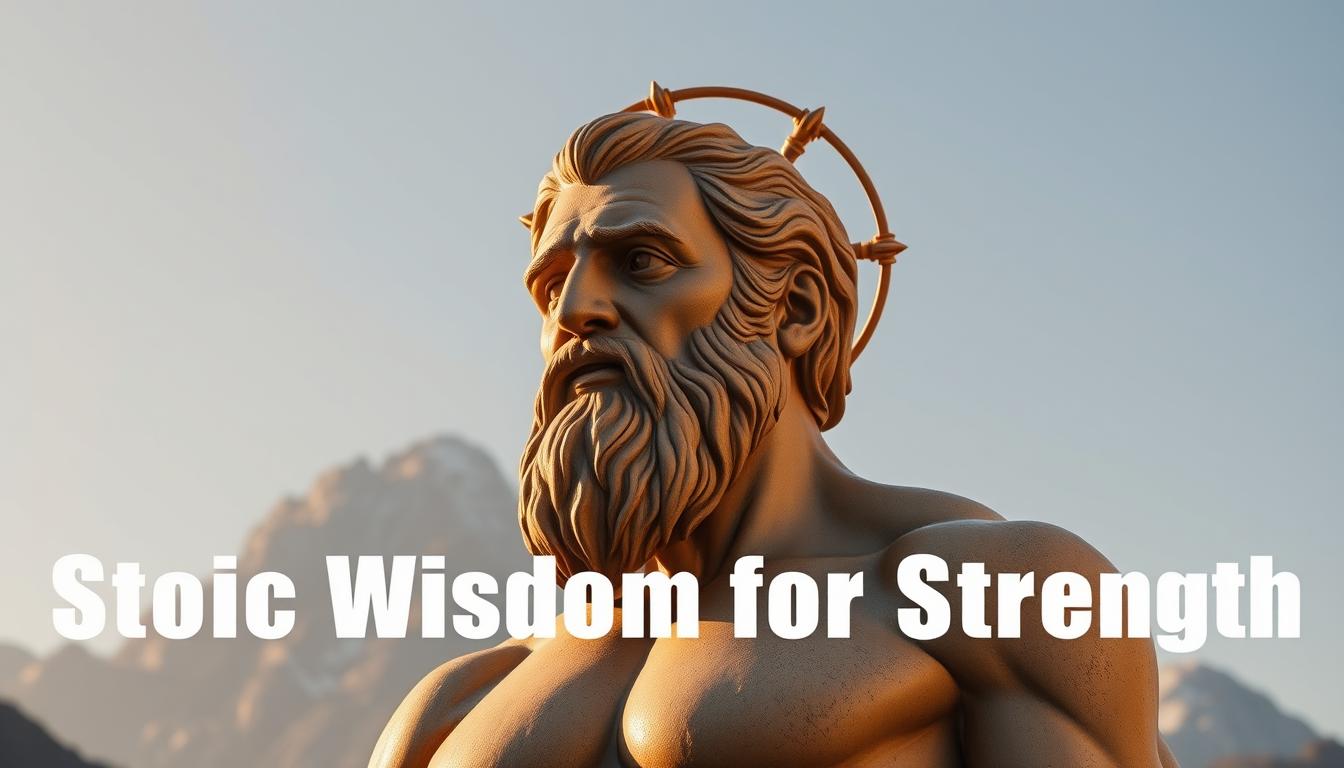Have you ever felt like you’re not living up to your potential as a man? You’re not alone. Many men struggle with feelings of inadequacy, wondering if they’re truly strong and resilient.
True strength isn’t just about physical prowess; it’s about emotional intelligence, personal growth, and a deep understanding of oneself. In today’s world, it’s easy to get caught up in societal expectations of masculinity, but stoic wisdom offers a powerful antidote to these pressures.
By embracing stoicism, you can develop the inner strength and resilience needed to navigate life’s challenges. This article will explore the signs of weakness that many men struggle with and provide guidance on how to cultivate true strength through stoic principles.
Key Takeaways
- Understanding the signs of weakness in men
- The importance of emotional intelligence in masculinity
- How stoic wisdom can foster personal growth
- Practical strategies for developing inner strength
- The role of resilience in overcoming life’s challenges
Understanding True Strength Through Stoic Philosophy
In the realm of Stoic philosophy, true strength is not about physical prowess but about inner strength and emotional resilience. This ancient school of thought emphasizes the importance of developing a robust inner character, capable of withstanding life’s challenges without being swayed by external events.
Stoicism, founded in Greece by Zeno of Citium, teaches that individuals should focus on things within their control and cultivate a sense of detachment towards things outside of their control. This philosophy is rooted in the idea that true strength comes from within.
The Stoic Definition of Strength vs. Modern Misconceptions
Modern society often misconstrues strength as physical power, wealth, or social status. However, Stoic philosophy challenges this notion by defining strength as the ability to remain calm and composed in the face of adversity. As the Stoic philosopher Epictetus once said, “It’s not what happens to you, but how you react to it that matters.”
“It’s not what happens to you, but how you react to it that matters.”
The Stoic definition of strength is closely tied to the concept of emotional resilience. It’s about being able to navigate through life’s challenges with equanimity and inner peace.
Why Inner Fortitude Matters More Than External Power
Inner fortitude is the backbone of Stoic philosophy. It’s what enables individuals to stand firm in their principles, even when faced with opposition or adversity. As Seneca, another prominent Stoic philosopher, noted, “We are more often frightened than hurt; and we suffer more from imagination than from reality.”
The following table highlights the key differences between external power and inner fortitude:
| Characteristics | External Power | Inner Fortitude |
|---|---|---|
| Source | Physical strength, wealth, social status | Inner strength, emotional resilience |
| Durability | Temporary, can be taken away | Long-lasting, internal |
| Impact | Can be superficial, may not affect inner character | Directly influences character and decision-making |

By focusing on developing inner fortitude, individuals can cultivate a sense of true strength that is not easily shaken by external events. This is the essence of Stoic philosophy and its approach to understanding true strength.
The Stoic Path to Authentic Masculinity
The path to authentic masculinity is rooted in ancient wisdom, which offers a compelling alternative to modern societal expectations. For men seeking a more meaningful and purposeful life, stoicism provides a rich framework for personal growth and development.
Stoic philosophy emphasizes the importance of living in accordance with nature and cultivating inner strength. At its core, stoicism is about developing a strong character, rather than merely conforming to external expectations of masculinity.
Ancient Wisdom for Modern Men
The stoic approach to masculinity is particularly relevant in today’s world, where men are often faced with conflicting messages about what it means to be a man. Ancient stoic wisdom offers a timeless guide, focusing on the development of character traits that are essential for a fulfilling life.
The Four Cardinal Virtues as Guideposts
The four cardinal virtues – wisdom, courage, justice, and temperance – serve as guideposts for men on the stoic path to authentic masculinity. These virtues are fundamental to developing a strong, resilient character.
- Wisdom: The ability to see the world as it truly is and to make decisions based on reason and insight.
- Courage: The strength to face challenges and adversity with confidence and determination.
- Justice: The commitment to living a life of integrity, fairness, and morality.
- Temperance: The practice of self-control and moderation in all aspects of life.
By embracing these virtues, men can develop a more authentic and meaningful sense of masculinity. As you embark on this journey, you will find that stoicism offers a powerful framework for personal growth and self-improvement.

7 Signs of A Weak Man According to Stoic Philosophy
In Stoic philosophy, the signs of a weak man are not necessarily about physical strength, but rather about the lack of emotional intelligence and self-awareness. The Stoics believed that true strength lies in one’s character and ability to navigate life’s challenges with equanimity.
The ancient Stoics were known for their wisdom on character development and the importance of living a virtuous life. They identified several key characteristics that distinguish a weak individual from a strong one.
How Stoics Identified Character Weakness
Stoics identified character weakness through their emphasis on self-awareness and emotional regulation. By cultivating a deep understanding of their own emotions and behaviors, individuals can recognize areas where they may be vulnerable to weakness.
This self-awareness is crucial in developing emotional intelligence, which is the ability to recognize and understand emotions in oneself and others. By developing this skill, individuals can better navigate complex social situations and make more informed decisions.

The Difference Between Temporary Struggles and Character Flaws
It’s essential to distinguish between temporary struggles and inherent character flaws. While everyone faces challenges, a weak man is characterized by persistent patterns of behavior that undermine his well-being and relationships.
Understanding the difference between these two concepts is vital in applying Stoic philosophy to everyday life. By recognizing whether one’s struggles are temporary or indicative of a deeper issue, individuals can take appropriate steps towards personal growth and development.
Sign1: Inability to Control Emotional Reactions
One of the primary indicators of a weak man, according to Stoic philosophy, is the inability to control emotional reactions. This lack of self-control can lead to impulsive decisions and actions that often result in negative consequences. Emotional regulation is crucial for maintaining inner strength and making rational decisions.
The Impact of Emotional Volatility
Emotional volatility reveals inner weakness because it indicates a lack of mastery over one’s emotions. When you’re unable to manage your emotions, you’re more likely to act impulsively, leading to regretful actions. Stoic philosophy teaches that inner strength is not about suppressing emotions but about understanding and managing them effectively.

Stoic Practices for Emotional Regulation
The Stoics employed several practices to regulate their emotions, including meditation and self-reflection. Meditation helps in developing mindfulness, allowing you to observe your thoughts and emotions without being controlled by them. Self-reflection, on the other hand, enables you to analyze your actions and emotions, understanding their root causes.
The Dichotomy of Control in Daily Life
A key Stoic practice is the dichotomy of control, which involves distinguishing between things within your control and things outside of it. By focusing on what you can control, you can reduce emotional turmoil caused by external factors. This practice helps in achieving a state of inner peace and emotional stability.
- Identify your emotions and their triggers.
- Practice mindfulness through meditation.
- Reflect on your actions and their consequences.
- Apply the dichotomy of control in daily situations.
By incorporating these Stoic practices into your daily life, you can improve your emotional regulation, leading to greater inner strength and resilience.
Sign2: Avoiding Responsibility and Blaming Others
Embracing personal responsibility is a cornerstone of Stoic wisdom, and its absence can signify a weak character. According to Stoic philosophy, taking ownership of one’s actions and their consequences is fundamental to building inner strength and resilience.

The Dangers of a Victim Mentality
Avoiding responsibility often manifests as a victim mentality, where an individual blames external circumstances or others for their misfortunes. This mindset not only hinders personal growth but also leads to a lack of control over one’s life. Stoicism teaches that true freedom and strength come from within, and that by accepting responsibility, you can regain control over your circumstances.
The victim mentality is a corrosive pattern of thought that can lead to a cycle of blame and negativity. By adopting this mindset, you risk becoming mired in a sense of powerlessness, unable to effect change in your life.
Embracing the Stoic Concept of Personal Responsibility
Stoic philosophy places a high premium on personal responsibility, emphasizing that individuals should focus on what they can control and accept what they cannot. This mindset allows for a more proactive and empowered approach to life’s challenges.
- Recognize your role in creating your current circumstances.
- Accept that you have the power to change your situation.
- Focus on actions you can take to improve your life.
Marcus Aurelius on Accepting Accountability
Marcus Aurelius, a prominent Stoic philosopher and Roman emperor, wrote extensively on the importance of personal responsibility in his work, Meditations. He emphasized that individuals should strive to understand their own character and actions, rather than blaming external factors. Aurelius’s writings serve as a powerful reminder that accepting accountability is a key component of personal strength and resilience.
“You have power over your mind – not outside events. Realize this, and you will find strength.”
This quote encapsulates the Stoic view on personal responsibility, highlighting the importance of focusing on what you can control and finding strength in your inner character.
Sign3: Seeking Constant External Validation
The Stoics identified seeking external validation as a key indicator of inner weakness and lack of self-sufficiency. When you constantly seek approval from others, you undermine your inner strength and autonomy.
Why Dependence on Others’ Approval Indicates Weakness
Dependence on others’ approval signifies a lack of confidence in your own judgment and values. This dependence can lead to a vicious cycle where you’re more focused on pleasing others than on developing your character.
Stoic principles emphasize the importance of self-sufficiency, encouraging individuals to look inward for validation rather than outward. By doing so, you cultivate a sense of inner worth that isn’t easily swayed by external opinions.
Developing Self-Sufficiency Through Stoic Principles
To develop self-sufficiency, you must practice Stoic principles such as mindfulness, self-reflection, and indifference to external events. This involves recognizing that you can’t control how others think or feel, but you can control how you respond to their opinions.
Epictetus’s Teachings on Inner Worth
Epictetus, a former slave who became a prominent Stoic philosopher, taught that true freedom and strength come from within. He emphasized that your worth shouldn’t be measured by external validation but by your character and actions. As Epictetus said, “It’s not what happens to you, but how you react to it that matters.”
“It’s not what happens to you, but how you react to it that matters.”
To further illustrate the concept of self-sufficiency, consider the following comparison:
| Trait | Stoic Approach | External Validation Approach |
|---|---|---|
| Self-Worth | Derived from inner strength and character | Based on others’ opinions and approval |
| Decision Making | Guided by personal values and principles | Influenced by the desire to please others |
| Resilience | Built through self-reflection and inner growth | Dependent on external support and validation |

By embracing Stoic principles and focusing on developing your inner worth, you can break free from the need for constant external validation and cultivate a more robust and resilient character.
Sign4: Fear of Discomfort and Hardship
Embracing hardship rather than fearing it is a hallmark of strength, not weakness. You might be surprised to learn that your avoidance of discomfort could be a sign of underlying weakness.
The Stoic philosophy emphasizes that facing and overcoming hardships is crucial for building character. When you shy away from challenges, you miss out on opportunities for personal growth.
How Comfort-Seeking Undermines Character Development
Seeking comfort excessively can undermine your character development by preventing you from experiencing and overcoming adversity. This avoidance can lead to a lack of resilience and inner strength.
Key effects of comfort-seeking:
- Reduced resilience
- Lack of personal growth
- Increased vulnerability to stress
The Stoic Practice of Voluntary Discomfort
The Stoics practiced voluntary discomfort as a means to build inner strength. By occasionally embracing hardship, you can develop a stronger character and improve your ability to handle life’s challenges.
Seneca’s Approach to Embracing Challenges
Seneca, a prominent Stoic philosopher, advocated for embracing challenges as a way to build resilience. He believed that by facing discomfort voluntarily, you can prepare yourself for life’s inevitable hardships.

By incorporating the Stoic practice of voluntary discomfort into your life, you can develop the strength and resilience needed to overcome adversity. This practice not only builds character but also fosters a deeper understanding of your capabilities.
Sign5: Inconsistency Between Words and Actions
The Stoics viewed the consistency between words and actions as a hallmark of a strong character. When you say one thing but do another, it not only confuses others but also undermines your own integrity. This inconsistency can lead to a loss of trust and respect from others, as well as internal conflict.
The Gap Between Intentions and Behavior
Often, the discrepancy between what you intend to do and what you actually do can be attributed to a lack of self-discipline or clarity in your values. To bridge this gap, you need to cultivate self-awareness and align your actions with your principles. This involves recognizing your weaknesses and working on them consistently.

Stoic Integrity: Aligning Speech with Action
Stoic philosophy places a high premium on integrity, which is about being true to your word and actions. Developing stoic integrity means you strive to ensure your behavior reflects your values and commitments. This alignment is crucial for building trust, not just with others, but also with yourself.
Zeno’s Principles of Consistent Character
Zeno, the founder of Stoicism, emphasized the importance of living a consistent life. He taught that your character is defined by your actions, not your words. To embody this principle, focus on developing habits and practices that reinforce your values and commitments. This involves a continuous process of self-reflection and improvement.
By embracing Zeno’s principles, you can cultivate a consistent character that is marked by integrity and reliability. This not only enhances your personal strength but also earns you the respect of others.
Sign6: Inability to Stand Alone in Principles
Standing alone in your principles is a hallmark of true strength, a concept deeply rooted in Stoic philosophy. In a world where conformity is often easier, maintaining your personal values despite opposition requires stoic courage and inner fortitude.

How Conformity Signals Inner Weakness
Conformity, or the act of adhering to societal norms without questioning, can often signal inner weakness. When you fail to stand by your principles, you not only compromise your personal values but also undermine your inner strength. This weakness stems from a lack of confidence in your beliefs and a fear of social rejection.
- Conformity can lead to a loss of personal identity.
- It often results in internal conflict due to the mismatch between personal beliefs and actions.
- Standing alone in your principles, on the other hand, fosters self-respect and integrity.
Stoic Courage in Maintaining Personal Values
Stoic courage is about more than just standing alone; it’s about doing so with conviction and integrity. It involves maintaining your personal values even when faced with adversity. This kind of courage is not just about grand acts but also about the daily choices you make to uphold your principles.
Cato’s Example of Unwavering Conviction
A historical figure known for his unwavering conviction is Cato the Younger, a Stoic who preferred death over compromising his principles. His story serves as a powerful example of stoic courage and the importance of standing by one’s values, even in the face of overwhelming opposition. Cato’s actions demonstrate that true inner strength lies in the ability to remain steadfast in your beliefs.
By embracing the Stoic philosophy, you can develop the courage to stand alone in your principles, fostering a stronger sense of self and inner strength.
Sign7: Neglecting Self-Improvement and Growth
One of the key indicators of a weak character, as per Stoic wisdom, is the lack of effort towards personal growth. The Stoic philosophy places a high premium on lifelong learning and continuous self-improvement.

Stagnation as a Sign of Character Weakness
Stagnation, or the lack of progress in personal development, is seen as a significant weakness. The Stoics believed that a life without growth is a life not worth living. They advocated for a proactive approach to self-improvement, where one continually seeks to better themselves.
- Embracing challenges as opportunities for growth
- Seeking knowledge and wisdom continuously
- Practicing self-reflection and self-awareness
The Stoic Commitment to Lifelong Learning
The Stoic commitment to lifelong learning is exemplified in the works of various Stoic philosophers. They emphasized the importance of continuous education and personal development.
Musonius Rufus on Continuous Self-Development
Musonius Rufus, a Roman Stoic philosopher, stressed the importance of continuous self-development. He believed that education should not stop after formal schooling but should be a lifelong pursuit. As Rufus noted, “The most important thing is to be a good human being, and this can be achieved through continuous learning and self-reflection.”
“The universe is change; our life is what our thoughts make it.”
This quote encapsulates the Stoic view on the importance of personal growth and adaptation. By embracing change and continually striving for self-improvement, you can lead a stronger, more resilient life.
Conclusion: The Stoic Journey to Authentic Strength
You now understand the 7 signs of a weak man through the lens of Stoic philosophy. Recognizing these signs is the first step towards cultivating authentic strength and personal growth. By embracing Stoic principles, you can develop the inner fortitude necessary to overcome life’s challenges.
The Stoic path to authentic masculinity involves controlling emotional reactions, taking responsibility, seeking self-sufficiency, embracing discomfort, aligning words with actions, standing by your principles, and committing to lifelong learning. By following these principles, you can build a strong character that is resilient in the face of adversity.
As you continue on your Stoic journey, remember that personal growth is a continuous process. It requires dedication and persistence, but the rewards are immeasurable. By integrating Stoic wisdom into your daily life, you can achieve authentic strength and live a more fulfilling life.









